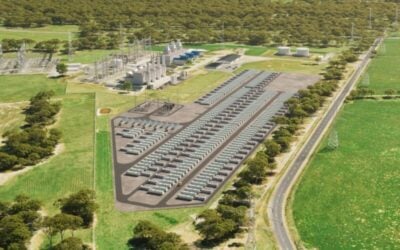
The Inflation Reduction Act took a significant step forward over the weekend as US vice-president Kamala Harris cast a decisive vote to break a 50:50 tie of Senators to pass the legislation.
Emerging late last month the deal, negotiated largely in the background by Senate Majority Leader Chuck Schumer and long-time holdout on Build Back Better, West Virginia Senator Joe Manchin, now goes to the House.
Enjoy 12 months of exclusive analysis
- Regular insight and analysis of the industry’s biggest developments
- In-depth interviews with the industry’s leading figures
- Annual digital subscription to the PV Tech Power journal
- Discounts on Solar Media’s portfolio of events, in-person and virtual
After that, it will reach US President Joe Biden’s desk where it can be signed into law. The House should pass the bill “as soon as possible,” and he looked forward to signing it into law, the president said.
Along with putting forward measures to limit healthcare costs and reduce the national deficit, the Act supports US-based manufacturing of clean energy technologies like solar PV and batteries and puts a total of US$369 billion into climate change-fighting measures.
Biden said it would be “the largest investment ever in combatting the existential crisis of climate change”.
“It addresses the climate crisis and strengthens our energy security, creating jobs manufacturing solar panels, wind turbines, and electric vehicles in America with American workers. It lowers families’ energy costs by hundreds of dollars each year.”
Despite the protestations of right-wing politicians including Texas Senator Ted Cruz that it would increase the tax burden on working Americans, Biden and other bill supporters are adamant that it would not increase taxes on anyone earning less than US$400,000 a year.
The bill’s many provisions will be paid for through levying of a standard 15% corporation tax rate.
What it means for energy storage
Chief among the impacts on energy storage is the inclusion of an investment tax credit (ITC) for standalone energy storage, including thermal as well as electrochemical storage. That could equate to around 30% reduction of capital costs of equipment purchases.
This is something the industry has of course argued the case for over the past few years and many commentators have welcomed the 10-year fixed term for the ITC as included.
A recurring theme appeared to be that the US energy storage industry is in a growth phase where many companies and investors are already active, but the Inflation Reduction Act could unlock so much more demand through giving investors a higher degree of certainty.
“We’re optimistic and excited about the potential legislation for standalone storage investment tax credits,” Adam Bernardi, renewable energy business development leader at EPC firm Burns & McDonnell told Energy-Storage.news.
“An ITC for standalone storage will provide the economics to support the development of more storage projects and help offset some of the current cost pressures the market is facing. As the market continues to grow, having a 10-year ITC in place could help alleviate the ‘boom or bust’ cycles that the market has seen. Owners can make longer term investment plans in development and project selection and not worry about step-downs in the ITC every few years.”
Wärtsilä Energy’s VP for energy storage and optimisation, Andy Tang, called it a “small carrot” to encourage uptake of battery storage and a timely intervention by the government during a growing climate crisis.
“Passing the investment tax credit for energy storage has never been more critical given President Biden’s acknowledgment that we’ve entered a new state of emergency over climate change,” Tang said in a statement.
“This small carrot will incentivise battery investment in the US, offset high costs caused by temporary supply chain issues, and give investors much-needed certainty. This is our chance to ensure affordable electricity bills for all Americans, create and preserve hundreds of thousands of good-paying clean jobs, generate meaningful local revenues from renewable energy development, and clinch a leading global position in the energy transition.”
In a recent interview with this site, Tang had said the supply chain challenges of the past couple of years have increased the cost base of battery storage by about 25% year-on-year. Tang also talked in the July interview about the undoubted boost to the industry that the ITC would provide, but said then that despite it enjoying bipartisan political support, he wasn’t optimistic about it passing anytime soon.
Another recent interviewee, KORE Power CEO and co-founder Lindsay Gorrill told Energy-Storage.news a few months ago that solving the US’ battery supply chain issues had been among the chief motivations for starting up his company.
KORE Power manufactures battery cells as well as racks and complete systems and is constructing a 12GWh gigafactory in Buckeye, Arizona.
“The Inflation Reduction Act is the strongest commitment to date from the federal government to accelerate the good jobs and American innovation that can only come from a strong, domestic, clean energy manufacturing sector,” Gorrill said in a statement yesterday.
“Over the last three years, disruptions and shortages driven by the pandemic, international conflict and runaway inflation have amplified the need for a robust domestic supply chain to produce products and tools needed for a safe, clean, reliable energy future, on demand and on time.”






